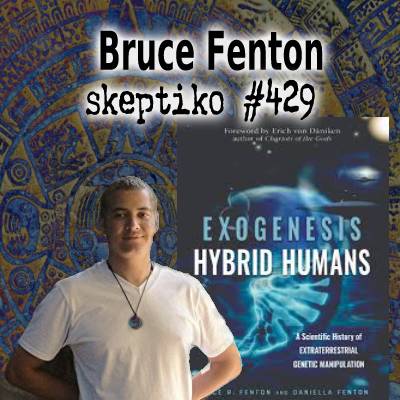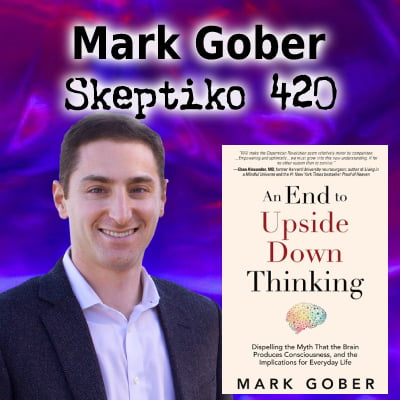Jonathan Robinson, can technology help spiritual seekers? |320|
This psychologist believes technology can be used to assist spiritual seekers.
photo by: Martin
When Jonathan Robinson contacted me about doing an interview for his new book, The Technology of Joy, my first reaction was — where’s the consciousness science in joy gadgets? But I dug a little deeper and discovered Jonathan to be an impressive author who’s serious about his pursuit of “joy,” spiritual enlightenment, and even psychokinesis:
Alex Tsakiris: I don’t think you can get to the ultimate goal by quickly saying, here are some meds that made me feel better for five minutes and I was able to get up off the couch. It’s great to get up off the couch and not feel stuck, and not feel depressed. But maybe looking deeper at what is the real meaning [and] purpose of life–maybe that’s ultimately a better way to treat the underlying cause than to treat the symptom of just how can I feel more joy right now? How can I feel better right now?
Jonathan Robinson: I agree with you that it’s always important to be seeking greater depth and truth. That’s one wing of a plane. The other wing of the plane is that you always be seeking some way to find peace and love as quickly and as easily as possible. So when you put those two wings together you can really fly. For people who just focus on feeling good, they have one very strong wing, and they don’t have the other wing that you mention which is seeking truth. If you have one wing of a plane that’s very strong and one wing that’s very weak, that plane flies around in circles and then crashes.
[box]
Listen Now:
Podcast: Play in new window | Download
Subscribe: RSS
[/box]
[box]
Subscribe:
[one_third_last] [/one_third_last]
[/one_third_last]
[/box]
Click here for forum discussion
Click here for Johnathan’s website
Read Excerpts From Interview:
 Jonathan Robinson: This is what everybody seemed to say: the purpose of life is to–and they really put it into two categories–number one, get to a point where you have found some peace and love within yourself; that you have a sense of the kingdom of heaven within, is what Jesus called it; or Buddha called your Buddha nature. You find some peace and love within yourself. Then from your foundation of peace and love go out and serve people in the world. You can’t give what you don’t have. So if you have no peace and love in your heart, it’s going to be very hard to be a good parent. It’s going to be very hard to be a good friend. So I see that what I’ve been doing is trying to find what are the best, most efficient ways for people to find this peace and love? And how can technology perhaps even help that so that people instead of meditating for 40 years in a cave, can use some gadget or something that they can find [peace and love] in 40 minutes rather than 40 years. That’s been an interest of mine because I think only if you change the quality of human beings and their experience will you create a better, more peaceful world.
Jonathan Robinson: This is what everybody seemed to say: the purpose of life is to–and they really put it into two categories–number one, get to a point where you have found some peace and love within yourself; that you have a sense of the kingdom of heaven within, is what Jesus called it; or Buddha called your Buddha nature. You find some peace and love within yourself. Then from your foundation of peace and love go out and serve people in the world. You can’t give what you don’t have. So if you have no peace and love in your heart, it’s going to be very hard to be a good parent. It’s going to be very hard to be a good friend. So I see that what I’ve been doing is trying to find what are the best, most efficient ways for people to find this peace and love? And how can technology perhaps even help that so that people instead of meditating for 40 years in a cave, can use some gadget or something that they can find [peace and love] in 40 minutes rather than 40 years. That’s been an interest of mine because I think only if you change the quality of human beings and their experience will you create a better, more peaceful world.
Alex Tsakiris: So we have to develop this base of contentment, peace, joy, kind of [idea]. That’s what you’re saying. You’re open to a lot of technology and means that would get us there. And then ultimately your life, once you get to that point, your life is about service and helping other people both as a way to further get that joy into your life, but also, why a life of service? Why do we serve?
Jonathan Robinson: Well, I think if you asked your hand why is it serving your body, and your hand could talk, it would say because I’m part of the body. And if I want this hand to be healthy I need to actually feed the body because we’re connected. I believe it’s the same with people. We’re basically one swarm of humanity, and we serve our function best when we realize we’re one cell in that humanity and by serving that humanity in a certain way we’re actually serving ourselves.
Jonathan Robinson: If scientific analysis of being a biological machine and nothing more works for you, I say fantastic. That’s what you should do.
Alex Tsakiris: Why is that fantastic and that’s what you should do? Don’t the big picture questions matter? You can dedicate your life to material things. We can ask whether or not that’s okay, or whether there’s any morality to it. We look around [and] obviously you’re someone who’s had spiritual experiences–extended consciousness experiences as I like to call them. Why would we equate that with someone who is bound up in a materialistic view? It’s all about me. It’s all about what I get. And [just] say, hey man, whatever floats your boat. I don’t believe that. Do you really believe that?
Jonathan Robinson: Well people have all kinds of ridiculous beliefs. No belief, whether it be my spiritual beliefs or somebody else’s scientific beliefs, [they’re] not the same as reality. Reality is very complex. Now, with reality being complex you can say, okay, what do we want to do? And as I mentioned before, there is a lot of agreement among spiritual leaders as to what the purpose of life is. And they say the purpose of life is to feel more loving, more peaceful, and then from your abundance be able to serve people.
Jonathan Robinson: I think it’s better to look at things in terms of practical effects we’re trying to create rather than what is really true or what really isn’t true where you just get lost into arguing beliefs. We’ve seen religious wars and everything else [and] it doesn’t really go anywhere.
Alex Tsakiris: I disagree. For me, the way that I’m wired, I have to know and answer in a rational, logical way the best that I can before I can proceed. I think a lot of people are like that. In particular, I think a lot of men are like that. We look at Scientology, at least a lot of us, and laugh and say that’s obviously a cult that was created by a science fiction writer who was trying to make a bunch of money.
Jonathan Robinson: Yeah.
Alex Tsakiris: Is it yeah? Or is it no? We look at the “born again” thing–I have many friends who are born again Christians and they’re wonderful people. I have some Mormon friends who are particularly, if you can generalize it like this but it’s been my experience, [they’re] some of the most truly, open, honest, cool people to be around. I do not hesitate to talk about the ridiculousness of the baby Jesus hypothesis; not to poke [Christians] but to say, am I reading something different than you are? Are you processing something that I don’t know? Otherwise, I feel like it would be disingenuous for us to have this kind of relationship. For me to say, I think you’ve been indoctrinated the same way I’ve been indoctrinated and haven’t availed yourself of some of the knowledge, some of the information that would cause you to change your beliefs. But I don’t even care about that. What I care about is what kind of conversation might we have? What kind of interaction might we have once we get past that because when you’re stuck in the baby Jesus hypothesis, any kind of real connection we’re going to have between this left hand and this right hand is going to be really limited. And we’re going to have these stupid conversations that most of us have had all our lives where we dance around and don’t talk about the real important, deepest [issues] because we don’t want to offend somebody. Or we don’t want to really talk about the stuff that’s going on. So I don’t know if I really can buy off on the “shut-up and calculate” model of spirituality. I want to know the truth the best I can know it.
Jonathan Robinson: Let me ask you, Alex. Let’s say you could know the truth the best you can know it. What do you hope to have happen from quote, “knowing the truth?”
Alex Tsakiris: I think there’s a certain grounding that comes with that. A lot of us have this cognitive dissonance that we all feel. We’re pulled in one direction but we have our doubts and our confusions. And when that is settled, in any number of ways I think all of us can relate to that being able to propel us forward; being able to feel more comfortable in our own skin; and being more accepting of other people. So I see it as being positive in those ways. Do you have any sense of that?
Jonathan Robinson: What I hear you say is that if you knew this truth or knew it in a deeper way you’d feel more grounded, more comfortable, and more accepting. I agree. You would. So I would say your pursuit of truth is actually a technique to help you to feel more grounded, more peaceful, more comfortable, more accepting. And as a technique I’d say if it works for you, great. I think those are good goals–to feel more grounded, peaceful, and accepting. Your technique is being a skeptic and trying to seek truth. I would say keep doing that if it’s working for you. Other people are going to have the technique of Jesus or Buddha. What I put forth, now there’s all these technologies that can help you to tap into that right away. So I think, and this is just a philosophical opinion, getting to the ultimate goal we’re trying to get to more quickly is better than taking 50 years.
Jonathan Robinson: I was a Psychic Studies major at UC Santa Barbara because I had what’s called “PK ability,” an ability to affect random number generators and I was really good at it. I was going to go into that but I realized the field was moving so slow that it would be like banging your head against the wall for 30 years. So I finally decided not to do that.
Alex Tsakiris: What’s up with PK and how does it connect with spirituality?
Jonathan Robinson: I don’t know what’s up with PK. I know that some people can do it and I’m one of them because I was tested a lot. It works by something called PFM, which is how quantum physics and my iPhone works. PFM stands for Pure Fucking Magic. So that’s how it works. I don’t even think it’s necessarily connected to spirituality. I’ve known some assholes who could do PK or psychic abilities that I didn’t think of as a good person. Some people can run a 4-minute mile. Some people can affect random number generators. I think that it does show that we don’t know everything about what’s going on. That’s the most interesting thing. We don’t know everything that’s going on in spirituality; we don’t know everything about how our minds work; we don’t know everything about ESP. It’s kind of like a Rorschach ink block test. Whatever people think says more about them than it does about it because we don’t know. It’s hard to sit with not knowing so we come up with all of these belief systems or “BS” (what I can belief systems), which just shows that we don’t feel comfortable sitting with not knowing. I know that PK works because I’ve been tested and the ability to do what I do is in the realm of–the chances are 1 in 50 billion. So I know that it happens. I don’t know why it happens but I find that it’s interesting. I think it points to the fact that everything is connected in some way and as science progresses and our instruments get better, we’ll soon know more about how consciousness and spirituality, and psychic abilities, and quantum physics, and all of those things are interconnected.
Alex Tsakiris: That leads to one other thing that I think is really interesting. Since you’ve gone down part of that path you could probably have an interesting opinion on this. I wonder what’s going on with the whole non-dual approach [as well]. People take it way too far sometimes. I’m not a person. I’m just floating in consciousness. Any identification with this ego-centered person who resides in the body of Jonathan, etc…And I get that on one level because there’s an often repeated truth that a lot of people seem to be pointing to so maybe we ought to take it seriously. But on the other hand, it seems to miss the point in a lot of ways. What you’re talking about is loving people and kindness, and gratitude; connecting with people. What a lot of people in the no-dual community are saying, yeah if you want, but none of it really means anything anyway. It’s all an illusion. We just need to get past the illusion. Do you have any thoughts on that?
Jonathan Robinson: There’s different levels of reality and if you confuse the levels you end up with gibberish. So on one level we are all one. You could say we’re made up of energy if nothing else, but you don’t want to use that as an excuse. [For example], if we’re living together and I say, hey Alex, you haven’t done the dishes. And your response is, hey, we’re all one, you’re confusing levels. So, yes, we are all one and you haven’t done the dishes. I think of it in terms of–there’s different ways to describe things and some are more accurate. You can describe a Van Gogh painting as consisting of certain parts lead, certain parts oil, certain parts pigment. But that’s not the best way to describe a Van Gogh painting even though it is accurate on one level. A better way to describe a Van Gogh is wow, that really moves me or that really is beautiful, or that really is something. I think when people are stuck with describing reality in one way and not seeing the other ways to describe it that are equally true, they can run into trouble.
[box]
More From Skeptiko

Talking to Humanity |623|
Futurist Chris Kalaboukis Sees AI as More Than a Machine One of the most fascinating..
AI Compared to What |622|
Why LLMs Are a Game-Changer for Truth There’s a lot of hand-wringing about the downside..
Pi8 Rips Rogan and Tucker |621|
Pushing AI to go deep into sentience, ET and spirituality How long will it be..
AI Being Smart, Playing Dumb |620|
Google’s new AI deception technique, AI Ethics? My Dad grew up in a Mob-ish Chicago..
I Got Your AI Ethics Right Here |619|
Conversations about AI ethics with Miguel Connor, Nipun Mehta, Tree of Truth Podcast, and Richard..
Will AI Redefine Time? |618|
Insights from Jordan Miller’s Satori Project… AI ethics are tied to a “global time” layer..
Google’s Honest Liar Strategy? |617|
AI transparency and truthfulness… Google’s AI, Gemini… $200B lost in competitive AI LLM market share...
William Ramsey, Why AI? |616|
William Ramsey and Alex Tsakiris on the future of AI for “Truth-Seekers.” [box] Listen Now:..
Buzz Coastin, Ghost in the Machine |615|
Buzz Coastin, ghost in the AI machine, AI sentience, spiking engagement metrics. [box] Listen Now:..
music by: Rafal Mac

























